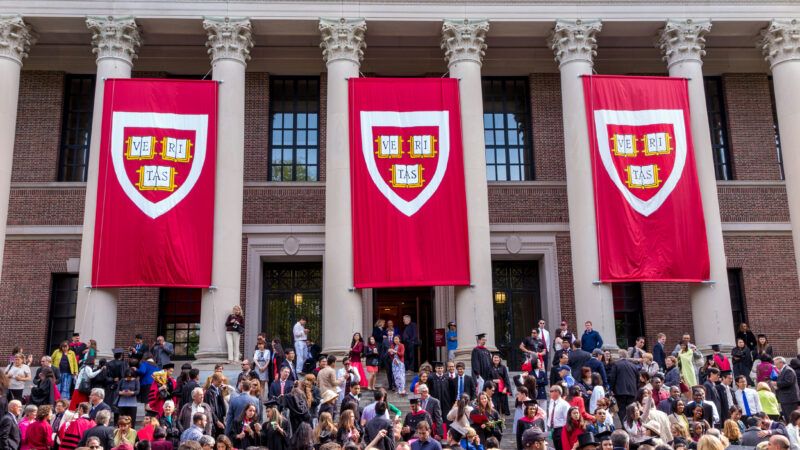Is This the End of the Ivy League Nepo Baby?
A new complaint argues that legacy admissions violate the Civil Rights Act.

On Monday, a civil rights group filed a complaint to the Department of Education challenging legacy preferences in college admissions, arguing that the policy discriminates against black, Hispanic, and Asian-American students by privileging the children of alumni and donors, who are mostly white.
In the wake of last week's Supreme Court decision striking down race-based affirmative action in college admissions, the group argues that legacy admissions policies similarly violate civil rights laws banning race-based discrimination. However, it's unclear whether the group's challenge can pass legal muster.
The complaint, filed by Lawyers for Civil Rights on behalf of several Massachusetts-based black and Hispanic nonprofit groups, claims that Harvard's legacy admissions policy violates Title VI of the Civil Rights Act by giving preference to the mostly white children of alumni and donors. The complaint argues this disadvantages nonwhite applicants and essentially limits the percentage of nonwhite students at the school.
"Experts have found that reducing or eliminating Donor and Legacy Preferences enhances diversity in higher education – an interest Harvard has claimed to be of the highest magnitude," notes the complaint. "The fact is that, if the Donor and Legacy Preferences did not exist, more students of color would be admitted to Harvard"
According to the complaint, Harvard applicants who are related to alumni or donors have a significantly better chance of being admitted than nonrelated students. For example, from 2014 to 2019, the admissions rate for donor-related students was 42 percent and the legacy admissions rate was 33.6 percent, while applicants without these preferences had an admission rate of just 6 percent. In all, 28 percent of the class of 2019 was the child or relative of a Harvard grad. During this same period, 70 percent of admitted students with a donor or legacy preference were white.
"The 'tip' that donor and legacy applicants receive in the process is substantial," the complaint argues. "Experts have estimated that 'roughly three-quarters of white [donor and legacy] admits would have been rejected absent their [donor or legacy] status.'" This disparity, argues the complaint, amounts to a violation of Title VI of the Civil Rights Act, which prohibits racial discrimination in programs receiving federal funding.
However, while the complaint is correct in arguing that legacy admissions are fundamentally unfair and that such policies may suppress diversity at many elite colleges, it's unlikely that these arguments will convince Education Department officials.
"I am skeptical that LCR's complaint will prevail, unless they can prove that Harvard's legacy preferences were adopted or maintained for the purpose of benefiting whites (or keeping out non-whites)," wrote law professor Ilya Somin in The Volokh Conspiracy (which is published by Reason) on Monday. "Title VI (and other current federal laws) do not ban legacy preferences as such. And courts are unlikely to invalidate them merely because they disproportionately help white applicants relative to those from other groups."
However, there is still hope for opponents of legacy admissions, especially when it comes to public colleges. While legal appeals are unlikely to succeed, Congress would be well within its rights to pass legislation to ban the practice in public colleges and universities—as Colorado already has. If they did, it would likely receive broad bipartisan support. According to a 2022 survey, 75 percent of Americans oppose legacy preferences.


Show Comments (76)